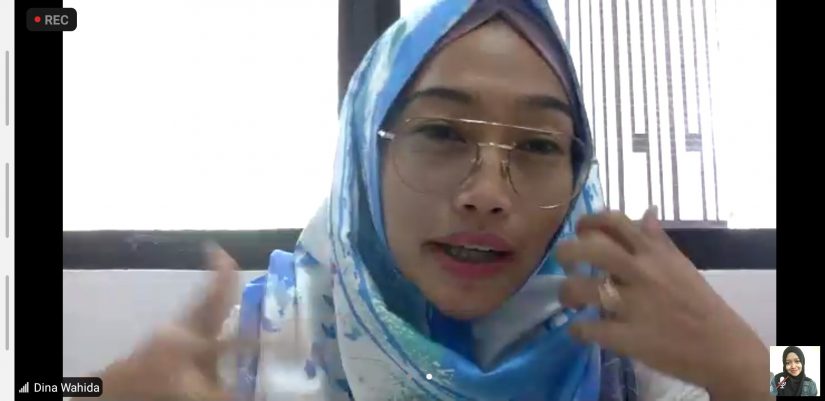
Yogyakarta, October 1st 2020—Anyone can experience mental disorders, including students. Realizing the need for lecturers support for the mental health of students, Career Development Centre (CDC) Fisipol UGM, held a Mental Health Workshop on The Role of Lecturers in Supporting Mental Health in the FISIPOL UGM Environment. A lecturer of the Faculty of Psychology of UGM, Muhana Sofiati Utami, became the speaker, meanwhile the psychologist of CDC FISIPOL UGM, Dina Wahida, became the moderator in this event that was joined by dozens of FISIPOL UGM teaching staff.
“Students usually experience mental disorders such as anxiety, depression, procrastination, and dependence,” Muhana said. According to her, enough levels of anxiety could motivate a person. But, if it became too much, anxiety could cause insecurity for someone and thought that something bad would happen to them. Moreover, students can be depressed, from mood disorder to suicide attempt. Depression can be caused by feelings of someone who feels very belittled, worthless, very guilty, to the point of feeling very lost. Then, Muhana said, students also often procrastinate in doing assignments. She also admitted that sometimes the lecturers also did it. The reality is that many people procrastinate because they are too focused on doing other things. Other than that, she said that many students experience internet dependence. When making a survey in her class, Muhana received many answers from students that they could spend hours in front of gadgets. “There are those who watch Korean dramas, play games, and open the internet for hours so they can’t do anything else,” Muhana said. She added that the more extreme dependency of the youth is in cigarettes, alcohol, and illegal drugs.
Muhana explained that the characteristics of a mentally healthy individual are being able to build positive relationships with others, enjoy helping and being helped by others, and being responsible. Other than that, a healthy individual can respect themselves and not compare themselves to other people, also they do work based on their capabilities and talents. She said that there are students who force themselves to do things that are not suitable with their abilities, because they compare their achievements with others. In fact, added Muhana, everyone has their own talents. “If we can do the jobs based on our competencies, then we can get good results,” she explained.
“Fisipol students are already aware about mental health issues, but many of them are self-diagnosed themselves,” Dina Wahida said. This psychologist of CDC said that the existence of CDC helps the students to be aware about the importance of mental health issues. But, on the other hand, many students came to the psychologist service of CDC to fulfill their academic purposes. Responding to this, Muhana said that she had also met the same thing at Gadjah Mada Medical Center. She explained, there were students who diagnosed themselves and it turned out to be true, but many also turned out to be wrong. Muhana said, CDC psychologists and FISIPOL lecturers need to understand the condition of students who claim to have mental disorders. She suggested that the CDC Fisipol psychologist determine whether the student really had a mental disorder or was just pretending.
Continuing the question from Dina, Lisa Lindawati, the lecturer at the Department of Communication Sciences (Dikom), also asked how the lecturer faced students who claimed to have mental disorders. Muhana suggested that the lecturers should listen to the students’ stories first. However, she continued, it does not mean that lecturers will solve problems from students. Muhana said, lecturers who are willing to listen to problems‒that affect academics‒of students have actually helped to ease the burden of these students. This is because students feel they are heard and it allows them to determine the next steps to solve their problems. “If the lecturer is unable, the lecturer can refer the student to someone who has more authority, for example a CDC psychologist,” Muhana explained.
“When working on a thesis, students look very competitive. Some are motivated, but others feel depressed,” Jusuf Wahyuono said. The teaching staff at Dikom, who was once a thesis tutor, asked about how to be a good thesis tutor in accompanying students in these conditions so that students remain enthusiastic. According to Muhana, a lecturer or thesis tutor needs to make a conducive condition, it means that students can support and help each other. She added that lecturers or thesis tutors could also encourage the friends of students who felt down to encourage them. However, lecturers or thesis tutors must also understand that everyone has a different personality type, so they can treat students appropriately.
